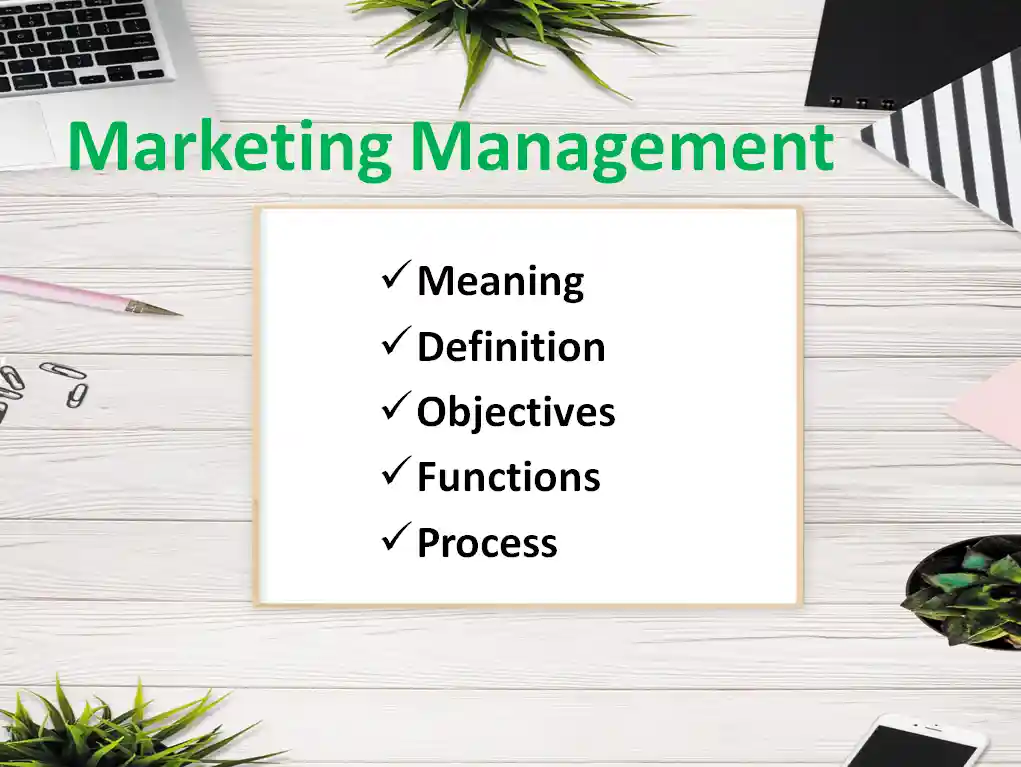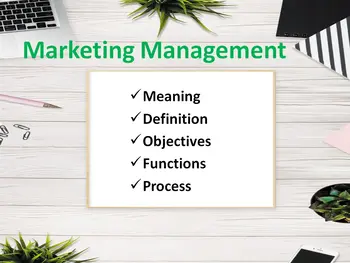Table of Contents:-
- Marketing Management Meaning
- Marketing Management Definition
- Objectives of Marketing Management
- Functions of Marketing Management
- Process of Marketing Management
Marketing management is an important aspect for any business to be successful. It involves the planning, implementation, and control of marketing strategies to achieve the goals and objectives of the business.
Marketing Management Meaning
Marketing Management is the compound word ‘marketing plus management.’
The term ‘Marketing’ is the total system of business activities while management is the art of getting things done in a coordinated and harmonious manner.
Related Article: Marketing Environment
Marketing management is a branch of total management and is concerned with the direction of those activities toward the attainment of marketing goals, i.e., the satisfaction of customers’ needs, increase in sales volume, and increase in the organisation’s profits. All activities directed towards the attainment of these marketing goals may be characterised as marketing management.
Marketing Management Definition
According to Philip Kotler, “Marketing management is the process of planning and executing the conception, pricing and promotion and distribution of goods, services and ideas to create exchanges with target groups that satisfy the customer and organisational objectives”.
According to the American Marketing Association, “Marketing management is the process of planning and executing the conception, pricing, promotion and distribution of ideas, goods, and services to create exchanges that satisfy individual and organisational objectives”.
Related Article:- Management Development
All these three goals are interrelated. Thus, Marketing Management is a functional area of business management that has to deal with the consumers’ needs and wants. The first place is followed by promotion and pricing to create specific demand for the goods services or ideas in question. Then the flow of goods or services or ideas to the customer and finally information from the customers about expected satisfaction.
Objectives of Marketing Management
Just as the purpose of every business is to earn a reasonable profit by fulfilling the needs of customers, the goal of marketing management is to achieve the business objectives. In light of this statement, the basic objectives of marketing management are given below:
1) Creating New Customers: The marketing manager should take all required steps such as sales promotion activities, advertisement, etc., to attract new customers to buy the firm’s product. This will help to increase sales.
2) Satisfying the Needs of Customers: The marketing manager should study the customer’s demand before offering them any product or service as modern marketing begins and ends with the customers.
3) Enhancing the Profitability of the Business: Since the marketing department is the only department that generates revenue for the firm, the survival of the firm mainly depends on the efficiency of the marketing department to generate profit. Thus, marketing management aims at increasing the profitability of the company through the sale of products.
4) Raising the Standard of Living for the People: Marketing facilitates the production of a wide variety of goods and services to satisfy customers’ needs. It, therefore, helps to raise the standard of living of people.
Related Article: Product Life Cycle
5) Determining the Marketing Mix: Here, marketing management aims at proper planning of the marketing mix to fulfil the necessities of different kinds of customers. Marketing mix refers to the culmination of various elements such as product, price, promotion, and physical distribution.
Functions of Marketing Management
Functions of Marketing Management includes the following points:
- Determining Marketing Objectives
- Planning
- Organising
- Staffing
- Directing
- Coordinating
- Motivating
- Controlling
- Analysis and Evaluation
- Promotion
- Research and Development
1) Determining Marketing Objectives
Marketing management determines the marketing objectives. The objectives of marketing may be short-term or long-term and need a clear approach. They have to be in coherence with the objectives of the organisation.
2) Planning
After objectively determining the marketing goals, the important function of marketing management is to plan how to achieve those objectives. This includes marketing programme formulation, sales forecast, and marketing strategies.
Related article: Characteristics of Management
3) Organising
A plan once formulated needs implementation. Organising functions of marketing management involves the collection and coordination of required means to implement a plan and achieve predetermined objectives. The organisation involves the structure of the marketing organisation, duties, responsibilities, and powers of various members of the marketing organisation.
4) Staffing
The employment of right and able employees is crucial to the success of a market plan. The market manager coordinates with the human resource manager of an organisation to be able to hire the staff with the desired capability.
5) Directing
Direction in marketing management refers to the development of new markets, the leadership of employees, motivation, inspiration, guidance, and supervision of the employees. The management executive issues essential directions to his subordinates and coordinates all the activities under the marketing divisions. He should also direct and coordinate the activities of other departments.
6) Coordinating
Coordination is the essence of management, for the achievement of harmony of individual effort towards the accomplishment of group goals is the purpose of management, It directs to the harmonious adjustment of the activities of the marketing organisation. It involves coordination among various activities such as sales forecasting, product development, warehousing, product planning, transportation, etc.
Related Article:- Nature of Marketing
7) Motivating
The success of the management executive can well be judged by how far he can motivate the staff under him to maximise his effort to achieve the targets of the enterprise, i.e., maximum sales and profits with maximum satisfaction of the customer.
8) Controlling
Marketing objectives can only be achieved if the various marketing activities are properly controlled. It refers to the effectiveness with which a marketing plan is enforced. It involves the evaluation of actual performance, determination of standards, and adoption of corrective measures. Control of various activities is essential to keep the marketing costs within admissible limits.
9) Analysis and Evaluation
Modern marketing concept stands for the satisfaction of the consumers. Marketing management involves the evaluation and analysis of the productivity and performance of individual employees.
10) Promotion
The ultimate objective of all enterprises is to maximise sales. This aim should not be overlooked by the marketing executive and he should make all possible efforts to promote the sales of the company. For this purpose, he should employ all the new techniques and methods.
11) Research and Development
Changes in the habits, tastes, and preferences of consumers are taking place all the time. The marketing manager must study and carry on research and adopt the product in conformity to the preferences of the final consumers. Any slackness in the research and development of the products might cause adverse effects on the total sales of the product or products.

Process of Marketing Management
Steps in the marketing management process are given below:

Step 1: Setting Marketing Objectives
The process of marketing starts with the activity of setting objectives. The organisational mission provides the priorities for scanning the environment and finding out the possibilities.
Step 2: Analysing Marketing Opportunities
This involves analysis of opportunities in the light of company strengths and weaknesses – both internal and external. The task may be to analyse long-run, short-run or medium-term opportunities.
To identify and evaluate its opportunities there are the requirements for a reliable market information system. This helps the organisations know the needs and wants of their customers, their locations, buying, social practices and so on.
Step 3: Researching and Selecting Target Markets
Now the company is ready to research the selected markets. It needs to know how to measure the attractiveness of any given market. Marketing people must understand the main techniques for measuring market potential and forecasting future demand.
These become the key inputs in deciding which new products and markets to focus on. Modern marketing concept cares for dividing the markets into smaller segments, evaluating them, selecting and targeting certain ones and deciding on the organisation’s positioning in each market.
Step 4: Designing Marketing Strategies
The marketing strategy spells out the game plan for attaining the business’s objectives or product/market objectives. The marketing strategy may be defined as “Marketing strategy defines the broad principles by which the business unit expects to achieve its marketing objectives in a target market. It consists of basic decisions on total marketing mix, marketing expenditure, and marketing allocation”.
The four P’s of marketing management product, price, promotion and place are decided and directed at the consumer based on proper diagnosis of the firm-market system arrived through the process of marketing research.
The organisation has also to decide how to divide the total marketing budget among the various tools of the marketing mix.
Related Article:- Scope of Marketing
Step 5: Planning Marketing Programmes
It is not enough to formulate only the broad strategies by which the business wishes to achieve its marketing objective but also plan the supporting marketing mix programmes. Without such programmes, even the best-conceived marketing techniques may fail.
Decisions have to be taken regarding the packaging, servicing policies, features, branding, etc., of the product the wholesale and retail prices, discounts, allowances and credit terms, and the identification, recruitment and linking of various marketing facilitators so that its products and services are efficiently supplied to the target market; advertising, sales promotion, publicity, etc.
Step 6: Organising, Implementing and Controlling the Marketing Effort
The final stage in the marketing process is organising the marketing resources and implementing and controlling the marketing plan. The company is required to design a marketing organisation that will be able to degenerate the marketing plan up to work, i.e., implementing its effort. After the marketing campaign is launched among the target customers, direct contact programmes are designed to retrieve feedback from individuals; alternatively, the sales records can also be checked for a measure of the effectiveness of marketing. If needed, control can be exercised for adjustments or modifications.
The marketing control process establishes performance standards evaluates actual performance and reduces the differences between desired and actual performance. Control involves measurement, evaluation, and monitoring. Resources are limited and expensive so it is important to control marketing plans. Control involves setting standards. The marketing manager will then compare actual progress against the standards. Corrective action (if any) is then taken. If corrective action is taken, an investigation will also need to be undertaken to establish exactly why the difference occurred.
You May Also Like:-

